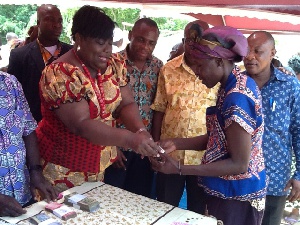 Nana Oye Lithur disbursing Leap fund
Nana Oye Lithur disbursing Leap fund
Armando Barrientos, a visiting professor from the University of Manchester in the UK, has challenged government to invest about one percent of the Gross Domestic Product (GDP) into social interventions programmes in order for the country to attain universal social protection.
According to Professor Barrientos, 75 percent of countries worldwide spend between 1 and 2 percent on social protection; and emphasised it is important for government to have a framework that is “understood and agreed by everyone that responds to communities”.
“I think Ghana is taking significant strides forward in developing a comprehensive social protection system: there has been an expansion of the LEAP, NHIS so it’s a significant step forward, so let’s hope it continues to cover the population.”
Speaking at the University of Ghana Business School (UGBS) and UNICEF lecture on the topic ‘The global growth of antipoverty transfers: Lessons for Ghana?’, Professor Barrientos said for the country to bridge the social protection divide evenly, it has to build capacity and gather information as well as ensure accountability in the community.
Dr. Esther Ofei-Aboagye from the National Development Planning Commission (NDPC) indicated at the lecture that the country spends a little over 0.5 percent on social protection; however, Professor Barrientos felt the country should do more in that regard.
“I think it needs to increase. At least double of that. I think one percent of GDP will be the next milestone. But it is not just a matter of money; rather, having the right policy framework,” he said.
Professor Barrientos explained that the types of transfer programmes in social interventions include Pure Income transfers, which contain social pensions, child grants, family allowances [South Africa’s Older Person Grant, Argentina's Family Allowance].
He also added that the Income transfers combined with asset accumulation Human development [Mexico’s Oportunidades, Brazil’s Bolsa Família] Infrastructure, community, physical assets [India’s National Rural Employment Guarantee, Ethiopia’s Productive Safety Net Programme], the Integrated poverty reduction programmes as evidenced in [Chile’s Chile Solidario, BRAC’s CFPR-Targeting the Ultra Poor, China's DiBao], are all major transfer programmes that the country could leverage on.
“The Programme types reflect poverty diagnosis; income or consumption deficits; productive capacity; and exclusion, respectively,” he said.
Ghana is developing a Social Protection Policy (SPP) to address poverty, vulnerability and exclusion in the country, Minister for Gender, Children and Social Protection Nana Oye Lithur has said.
If completed, the SPP will ensure the provision of essential social services to people irrespective of their socio-economic status.
Dr. Ofei-Aboagye of the NDPC also acknowledged that if social protection interventions are adequately designed and implemented, they will contribute to socio-economic development and also narrow the country’s inequality gap.
She said it is important for the country to equip the human resources and invest in human capital in ways that will maximise the country’s resources.
“If we are able to bring those in poverty out and help them to be creative and innovative, it will ensure the future of this country. Again, as we aspire to middle-income status we can’t have a lower-income situation around our people.
We should be able to guarantee them a certain basic minimum in terms of social services, opportunities for children; and also ensure the well-being of working people who want to work but cannot, and also that our older persons not suffering.”